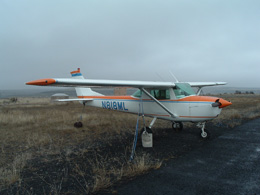On March 8, 1960, voters approve the formation of Grant County Port District No. 6, also known as the Port of Wilson Creek. The port district encompasses the small community of Wilson Creek in northern Grant County. The Port is originally formed in opposition to the plans of the Port of Quincy to absorb Wilson Creek and other northern Grant County communities. After winning a legal battle against the Quincy port district, the Port of Wilson Creek will have a relatively quiet 24 years. Activity will resume in earnest in 1984 when the Port begins planning to renovate the town airport. By 2011, the Port will have constructed a 3,074 by 55-foot runway with supporting facilities.
Wilson Creek and the Port of Quincy
The small town of Wilson Creek lies in northern Grant County and was incorporated in 1903. When Grant County was formally created in 1909, Wilson Creek was its largest town, with a population of 600. By the beginning of the 1960s, however, the town had experienced little growth, and despite Grant County being the state’s fastest-growing county in the previous decade, Wilson Creek was now dwarfed by larger towns to the south.
One of those towns, Quincy, formed Grant County’s first port district in March 1958. In late 1959, the Port of Quincy announced it would attempt to annex the northern portion of Grant County, including the towns of Coulee City, Grand Coulee, Hartline, and Wilson Creek. Not stopping there, Quincy announced in January 1960 that it would move toward absorbing all of Grant County into its port district, except for the Royal Slope-Beverly and Mattawa-Wahluke Slope areas, which had formed their own ports later in 1958. Quincy officials sought to put the issue on the November general-election ballot.
Drama in Grant County
Wilson Creek was the first community to voice opposition to the expansion. In the last week of December 1959, Wilson Creek announced its intention to form a port district, which would prevent the town from being swallowed by a future expansion of Quincy or any other port. Wilson Creek fought the expansion because it was worried that the larger population in Quincy would have greater sway over port decisions and would hold too much control over the less-populated north. Hartline, Coulee City, and Grand Coulee quickly followed suit and moved toward forming their own port districts. The four port hopefuls sought to be included on the ballot for a special election in March 1960, eight months before the Quincy expansion would be put to a vote.
The northern towns met on January 12 with representatives from the Ephrata Chamber Port Committee to discuss the matter. Wilson Creek and the others found no friends on the committee. Ephrata, as the county seat of Grant County, made clear that they "would support nothing less than a countywide port district" (Grant County Daily Journal, January 13, 1960). Undeterred, the northern towns pressed forward with their plans.
The Port of Quincy made a last bid on February 23 when it filed a request with the Grant County Superior Court to block the ports from forming. Quincy further requested that their measure to expand be moved from the November general election to the March special election, replacing the port formation measures. Quincy argued that a nearly countywide port district would be the most efficient mode of operation, as evident from the Port of Seattle (King County) and Port of Tacoma (Pierce County). They added that southern Grant County had a much greater tax pool to draw from, roughly $45 million, whereas the north only had about $7 million; therefore, a countywide port district could better redistribute tax dollars. Dr. Charles Harbaugh told the Grant County Daily Journal that Quincy was not "trying to force anyone ... we desire more time to educate the voters in the advantages of one good port district" (Grant County Daily Journal, February 17, 1960).
Unfortunately for the Port of Quincy, Grant County Superior Judge Felix Rea disagreed and allowed the port formation votes to appear on the March special-election ballot. Wilson Creek voters brought the Port into existence by an enthusiastic 190-13 margin on March 8, 1960. The first commissioners were Robert Schnell, Fred Bohnet, and Tom Middleton. In addition to Wilson Creek, voters in the towns of Hartline, Grand Coulee, and Coulee City also voted their ports into existence.
Wilson Creek Airport
Although the Port’s creation was certainly tumultuous, the ensuing years were relatively quiet. By 1975 the Port had begun leasing the Wilson Creek Airport for a token $1 a year. The airport, however, was in state of disrepair for the most of the 1970s, and major renovation did not begin until the mid-1980s.
In 1985, the Wilson Creek Airport was surveyed, and in 1989 the Port established power and electricity service, erected fencing, and renovated the runway. During the 1990s the Port merely did upkeep and maintenance work. Between 2001 and 2008, the airport began a new series of renovations and expansion that saw the runway updated, sealed, stripped, and seal coated, and a camera installed. In 2009-2010, the airport’s first building and bathroom was installed.
Presently (2011), the Wilson Creek Airport operates one 3,074 by 55-foot runway. The Town of Wilson Creek, Grant County Port District No. 6, and a local individual are the major landowners of the airport’s 119.74 acres. The land not owned by the Port is still leased for only $1 a year, and the current lease expires in 2018. The Port of Wilson Creek currently has plans to finish all ongoing projects and is considering adding a heliport to better serve its constituents.

